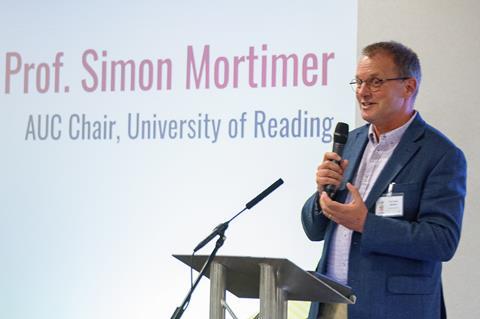Budding scientists urged to ’make agricultural research relevant’ at UK’s first all-farming PhD conference
Farmers and senior academics shared how to ensure tomorrow’s agricultural research has real on-farm impact at the Future Agricultural Researchers conference (FAR’23), the UK’s first ever conference for agricultural PhD students of all disciplines, which took place in Exeter on 14 November.

Organised by the Agricultural Universities Council (AUC), the conference aimed to help agricultural PhD students from across the UK meet peers, academic leaders, and industry experts, as well as learn more about careers in agri-science and getting advice on how best to communicate their research.
More than 110 PhD students attended, representing 27 universities and research institutions from across the UK, including the AUC’s 16 member institutions. The event was also supported by BBSRC and the Elizabeth Creak Charitable Trust.
Bringing together students with such a wide range of research topics, the conference agenda focused on what the students had in common. Panel discussions shared how students can best communicate about their projects, and how to make their research relevant.
Melanie Wright of Rothamsted Research, and Devon Farmer Andy Gray, spoke on the Making Research Relevant panel about the practical, on-farm, field trials they ran together as part of their Innovative Farmers’ field lab.
Wright said: “To ensure our research is relevant we need to consider: are we asking the right questions; are we doing research that can be applied in the real world; are we getting buy-in from those our research aims to benefits?”
Gray added: “I got involved to drive change in UK agriculture and have a positive impact. Collaborating with other farmers is a great way to do that - lots of us are full of curiosity! But working with the researchers gives a scientific backbone to what us farmers are discovering.”
Dr Alison Warrington, senior plant health advisor at the NFU, spoke about the benefits of working in partnership with farmers. She said: “Farmers are a key part of the solution to all of the challenges agricultural researchers are trying to tackle.
“It is farmers who will be trying the new crop protection methods, growing the new varieties, trialling the new technologies. And it is farmers who have the best knowledge of their farms, their environment, what works, and what’s needed. The value of this vast amount of knowledge cannot be underestimated.”
The NFU and other farming organisations are leading a series of workshops asking farmers what they need from agricultural researchers. This will help shape future research priorities for the AUC and funders.
Professor Simon Mortimer, Head of School of Sustainable Land Management at Reading University, is the Chair of the AUC, and also chaired the conference. He said: “Gone are the days when we can focus on a single discipline and have our head down and focus on our own experimental research. We need to recognise the value of other people’s work and approaches.
“At this conference, students have had the opportunity to look at how other people are tackling similar problems that relate to what they’re working on, maybe from a different paradigm or using a different set of research techniques.”
Nature Sustainability Editor Ryan Scarrow, and author, food journalist and broadcaster Dan Saladino, took part in a session about how to communicate research so that it can have an impact on the ground.
Saladino said: “I don’t hear enough from universities about projects that are interesting and relevant to a wider audience. In your shoes, I would listen to, and I would read, farming media to get a sense of the sort of stories that make it. Translate your ideas into something a busy journalist can pick up, then get in touch.”
The Agricultural Universities Council (AUC) is a collaboration of the 16 UK universities with agricultural schools or departments. The AUC works together to coordinate teaching and research, to make the biggest contribution these institutions can to a resilient and sustainable future for agriculture, land management, and food systems.
The members of the AUC are Aberystwyth University, Cranfield University, Harper Adams University, Hartpury University, Newcastle University, Queens University Belfast, Royal Agricultural University, SRUC, University of Edinburgh, University of Hertfordshire, University of Leeds, University of Lincoln, University of Nottingham, University of Reading, University of Warwick, and Writtle University College.



